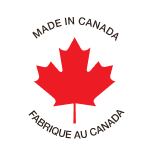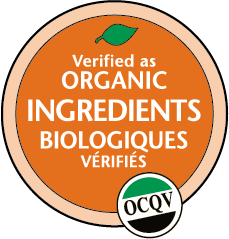
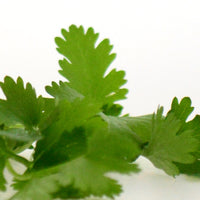
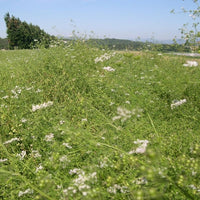
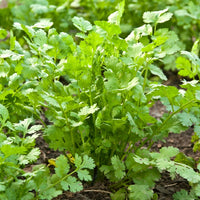
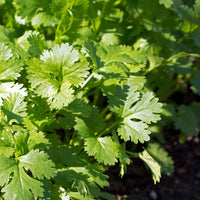
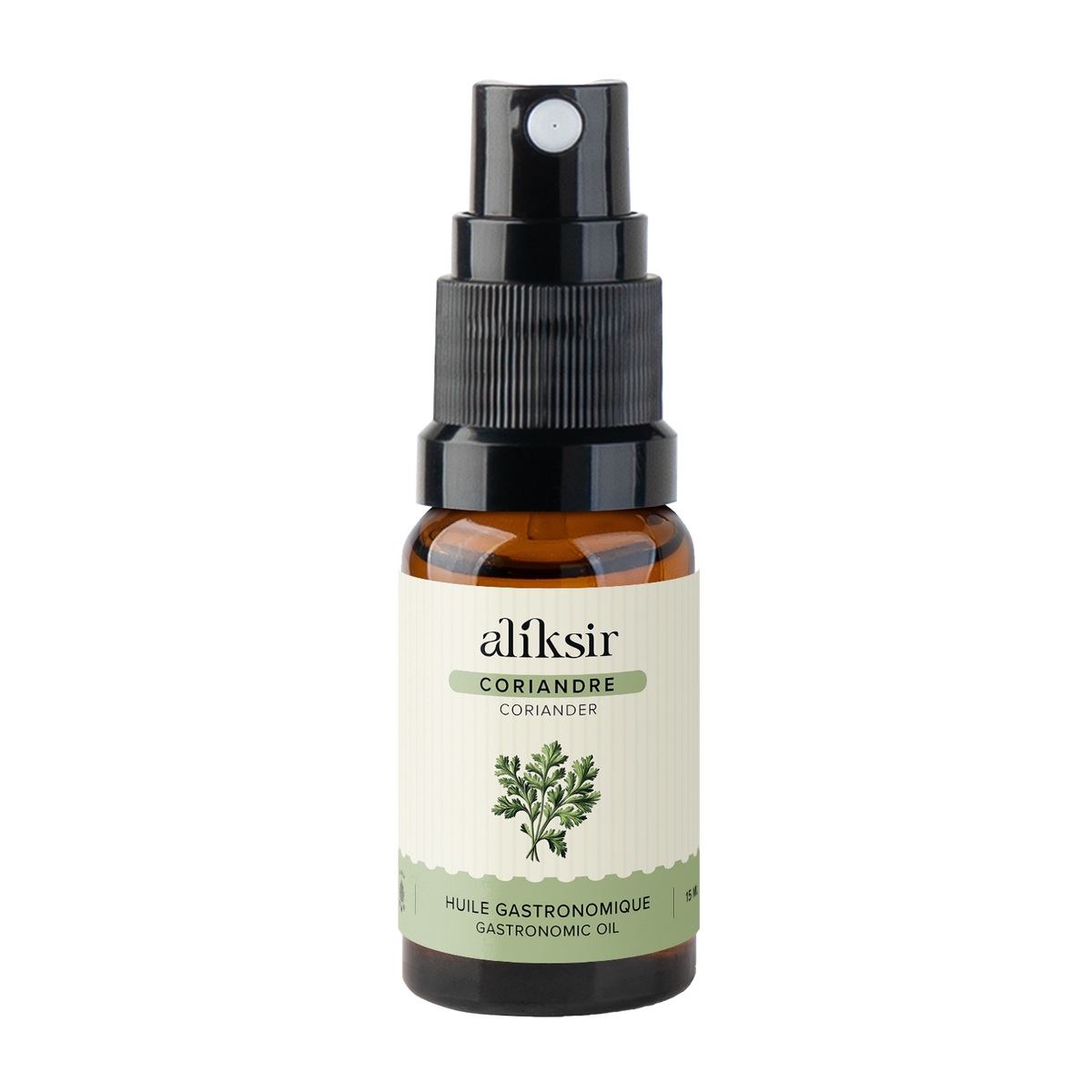

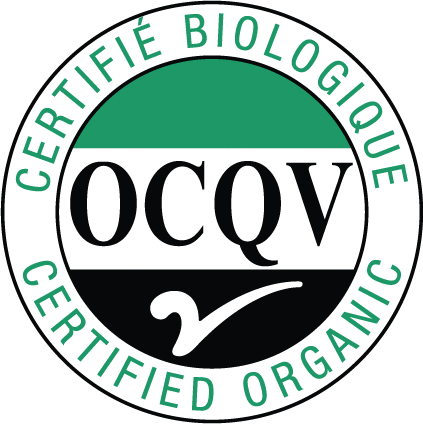
/
- Home
- Coriander leaf (Coriandrum sativum) - Organic Gourmet Oli
Coriander leaf (Coriandrum sativum) - Organic Gourmet Oli
Couldn't load pickup availability
Gourmet oils are pure or pre-calibrated essential oils in an organic sunflower oil base. A collection of natural, healthy, and authentic flavors that are easy to use.
| Latin name: Coriandrum sativum |
| French name: Coriandre (feuille) |
| English name: Coriander (leaf) |
| Family: Apiaceae (umbelliferae) |
| Country of origin: India, Hungary, Egypt |
|
Coriander is a herbaceous plant. It grows about 60 centimeters tall. Its leaves are broad and toothed. Its white or very pale pink flowers are typical of the Apiaceae family and are arranged in umbels. Coriander is a very ancient species. It has been cultivated for about 3,000 years. Coriander seeds have been found in Egyptian tombs dating from 1085-945 BC. |
Data sheet
Uses
FAQ
Filter by category
Essential oil is a fragrant, volatile substance extracted mainly through steam distillation from aromatic plants.
On average, there are 25 to 30 drops of essential oil in 1 ml.
However, this is not an exact value, as several factors can influence the number of drops, such as the oil's viscosity and the type of dropper used.
Each essential oil has unique properties. To choose the right one, it’s important to identify your needs: relaxation, stress management, better sleep, pain relief… For more personalized advice, we recommend visiting our stores.
Some essential oils contain allergenic molecules, and some people may be allergic to them. Therefore, individuals with allergies or sensitive skin should be cautious and test the product by applying two drops of the essential oil to the inner crease of the elbow. If no reaction occurs after 48 hours, the essential oil is suitable for you.
Essential oils are complex natural substances made up of hundreds of biochemical molecules. Each oil has a unique biochemical profile that can be used to verify its authenticity and purity. To determine if an essential oil is 100% pure, a scientific method called gas chromatography coupled with mass spectrometry (GC-MS) is used. At Aliksir, all oils sold are rigorously tested using this process to guarantee their authenticity, purity, and the absence of contaminants or additives.
The shelf life of essential oils is difficult to determine precisely. It also depends on storage conditions. Make sure to close the essential oil bottle tightly and protect it from light and heat. Under these conditions, essential oils can last between 3 to 5 years. In any case, always refer to the expiration date indicated on the product. An essential oil is considered expired if it was fluid but has become viscous, if its scent has changed from its characteristic aroma, or if its color has darkened compared to the original.
We recommend consulting an aromatherapy specialist or a doctor. If that is not possible, you should at least be informed about contraindications and potential interactions with other substances. Essential oils are highly active substances with a wide variety of molecules, so it is your responsibility to use them properly.
Not all essential oils are suitable for diffusion. Some contain molecules that can be neurotoxic, irritating, or too harsh for the respiratory system, especially in children, sensitive individuals, and animals. For example, peppermint, thyme thymol, sage, clove, cinnamon, and thuja are not recommended for diffusion. Before diffusing any essential oil, it is your responsability to know the different ways to use it safely.
Yes, but generally it is recommended to dilute essential oils in a carrier oil before applying them to the skin. Essential oils are powerful plant concentrates and can be irritating or cause adverse reactions when used undiluted on the skin. Carrier oils are excellent for essential oils and do not reduce their effectiveness. When carefully chosen according to the issue being targeted, carrier oils can work synergistically with essential oils. The more regular the use, especially for cosmetic purposes or on large areas of the body, the more essential oils should be dilute
No changes can be made after noon the day following the placement of an order. Any request to add or modify an order after this deadline will be treated as a new order and shipped separately.
Yes, once your order has been shipped, you will receive a tracking number by email. You can also always contact us at 1-866-596-3406.
Returns of defective or non-conforming merchandise:
All returns must be approved by phone before being made. Merchandise will be refunded or credited according to established conditions. No refunds will be granted if more than 60 days have passed since the order was shipped. For nebulizers, the warranty may vary depending on the product.
Restocking fees:
For all returns of non-defective merchandise, a restocking fee of 15% will be applied, and shipping costs will be the responsibility of the customer.
Refunds for non-defective products are conditional on the merchandise being in good condition; jars and bottles must not be opened and must remain in their original packaging.
The use of essential oils with children requires great caution. Their bodies are more sensitive, and some molecules can be irritating, toxic, or too strong for their developing system. Essential oils are not recommended for children under 6 years old, except under medical advice or guidance from a qualified aromatherapist.
Delivery times depend on your location and the chosen shipping method. Generally, orders are shipped within 24 to 48 hours and delivered within 3 to 5 business days in Quebec. For international shipments, delivery times may vary.
Individual Orders Shippable Within CANADA:*
• Free Standard Parcel Shipping via Canada Post with any order over $100 (before taxes)
• Standard Parcel Shipping via Canada Post
• Xpresspost Shipping via Canada Post
Some postal codes are excluded from regular shipping terms. Please contact us for the complete list of exceptions.
The chemotype of an essential oil refers to the dominant chemical variety of an aromatic plant—that is, the specific molecular composition of the essential oil extracted from that plant. In fact, the same botanical species can produce very different essential oils depending on factors such as climate, soil type, altitude, harvest period, and distillation method.
For example, thyme (Thymus vulgaris) can yield thyme CT thymol, thyme CT linalool, or thyme CT thuyanol (CT = Chemotype). These variants have different therapeutic properties. The chemotype is a guarantee of quality and traceability. It is indicated alongside the Latin name of the plant when that plant can produce multiple distinct chemical compositions.
A vegetable oil is a fatty substance extracted from plants, usually from seeds, fruits, nuts, or kernels. It is primarily composed of lipids (triglycerides) and is commonly used in food, cosmetics, and pharmaceuticals.
In aromatherapy and skincare, such oils are often called carrier oils because they serve to dilute essential oils before topical application.
A hydrosol (also called floral water when derived from flowers) is a byproduct of steam distillation of plants to extract essential oils. It is the aqueous (water-based) portion resulting from the process.

